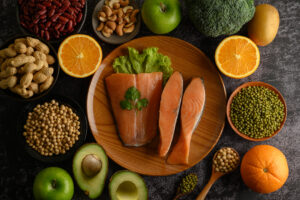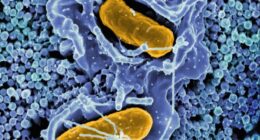Vitamin B12, commonly referred to as cobalamin, is a vital nutrient that plays a crucial role in numerous bodily functions. Vitamin B12 is an essential nutrient that plays a crucial role in supporting nerve function, promoting the production of DNA, and facilitating the formation of red blood cells. Its contribution to overall health cannot be overstated, making it a vital component of a balanced and healthy lifestyle. This blog will cover everything you need to know about vitamin B12, including its benefits, sources, and the consequences of deficiency.
The Importance of Vitamin B12
1. Supports Nerve Health
Keeping your nervous system healthy is crucial, and that’s where Vitamin B12 comes in. It’s essential for maintaining your overall well-being. It helps in the formation of the myelin sheath, a protective covering around nerves that ensures efficient transmission of nerve impulses. Adequate B12 levels are necessary for preventing neurological issues and maintaining cognitive function.
2. Aids in Red Blood Cell Production
B12 plays a vital role in ensuring our bodies produce enough red blood cells. It also plays a crucial role in creating hemoglobin, the protein found in red blood cells that helps transport oxygen throughout the body. Without sufficient B12, red blood cells can become large and irregularly shaped, leading to anemia and related symptoms like fatigue and weakness.
3. Supports DNA Synthesis
Vitamin B12 plays a role in DNA synthesis, ensuring that cells replicate correctly. This is particularly important for tissues with rapid cell turnover, such as the lining of the gut and bone marrow. Proper DNA synthesis is essential for growth, development, and overall cellular function.
4. Boosts Energy Levels
B12 is involved in converting food into energy by aiding in the metabolism of fats and proteins. Adequate B12 levels help maintain energy levels, reduce fatigue, and support overall physical performance.

Sources of Vitamin B12
Vitamin B12 is naturally found in animal products, making it a nutrient of concern for vegetarians and vegans. Check out these excellent sources of B12:
1. Animal Products
Meat: Beef, pork, and lamb are rich in B12. Organ meats, such as liver, are exceptionally high in this vitamin.
Poultry: Chicken and turkey provide reasonable amounts of B12.
Fish: Fish like salmon, trout, and tuna are excellent sources of B12.
Dairy: Milk, cheese, and yogurt contain B12.
Eggs: Eggs, especially the yolks, are a good source of B12.
2. Fortified Foods
For those who do not consume animal products, fortified foods are an essential source of B12. These include:
Plant-based milk: Almond, soy, and oat milk often have added B12.
Breakfast cereals: Many cereals are fortified with B12.
Nutritional yeast: This popular vegan product is often fortified with B12.
3. Supplements
Vitamin B12 supplements are available in various forms, such as tablets, capsules, and even sublingual (under-the-tongue) formulations. For individuals with absorption issues or dietary restrictions, supplements can be an effective way to maintain adequate B12 levels.
Symptoms of Vitamin B12 Deficiency
Vitamin B12 deficiency can cause a variety of health problems. Common symptoms include:
1. Fatigue and Weakness
Without enough B12, your body can’t produce sufficient red blood cells to transport oxygen efficiently, leading to persistent tiredness and weakness.
2. Neurological Symptoms
Deficiency can cause neurological symptoms such as numbness, tingling, difficulty walking, memory problems, and cognitive decline.
3. Anemia
Vitamin B12 deficiency can lead to megaloblastic anemia, causing symptoms like pale skin, shortness of breath, and dizziness.
4. Mood Changes
Low levels of vitamin B12 have been linked to changes in mood, such as depression and irritability. This is due to B12’s role in synthesizing neurotransmitters like serotonin.
5. Digestive Issues
A deficiency can cause digestive problems, including nausea, constipation, loss of appetite, and weight loss.
Risk Factors for Vitamin B12 Deficiency
Certain groups are at a higher risk of B12 deficiency, including:
1. Older Adults
As we grow older, our bodies become less efficient at absorbing B12. Older adults may need supplements or fortified foods to meet their B12 requirements.
2. Vegetarians and Vegans
Vitamin B12 is mainly found in animal products, vegetarians and vegans are more likely to be deficient in this essential nutrient. Fortified foods and supplements are vital for these individuals.
3. Individuals with Absorption Issues
Conditions like pernicious anemia, Crohn’s disease, and celiac disease can impair B12 absorption. People who have undergone gastrointestinal surgery may also face absorption challenges.
4. Pregnant and Breastfeeding Women
Pregnant and breastfeeding women need higher amounts of B12 to support fetal and infant development. They should ensure adequate intake through diet or supplements.
Conclusion
B12 is a vital nutrient that supports many critical functions in the body, including nerve health, red blood cell production, DNA synthesis, and energy metabolism. Ensuring adequate intake of B12 through diet or supplements is essential for overall health and well-being. Be mindful of the symptoms of deficiency and consider your dietary sources to maintain optimal B12 levels. Whether through animal products, fortified foods, or supplements, keeping your B12 levels in check is key to a healthy, vibrant life.









